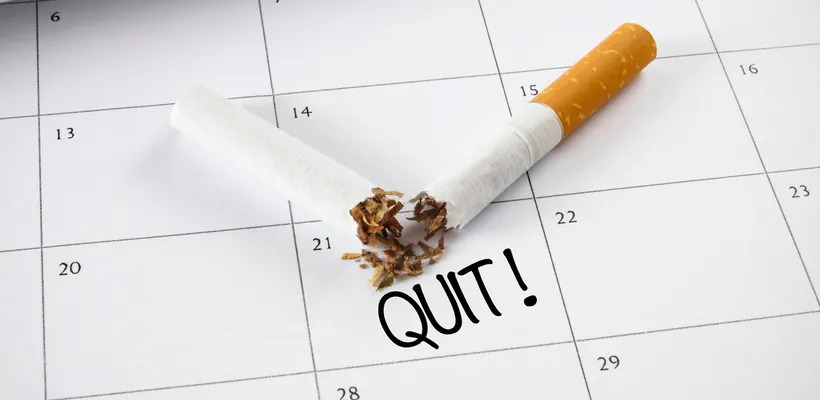
Published: 16th October, 2015 in: Health Advice News Pulse Quit Smoking
According to NHS statistics, 70% of Britons who currently smoke would actually like to give up. However, anyone who's been a smoker and has successfully kicked the habit will know that's easier said than done. Mark Sykes, one of our pharmacists, explains how we become addicted to smoking and the variety of options available to help you quit, for good.
"It's the nicotine in cigarettes that we become addicted to and nicotine itself isn't harmful. It's found in small amounts in tomatoes, aubergines and potatoes, for example, and is extracted from the tobacco plant. Related to the deadly nightshade family, it has been used to treat skin conditions and can even be used as an insect repellent to keep aphids at bay!
Popularised by Sir Walter Raleigh in Elizabethan times and smoked for the effect it has on the brain, it's the 4,000 chemicals in the tar produced by the tobacco in a cigarette, roll-up or pipe that cause the problem. 60 of those chemicals are proven to cause cancer.
Interestingly, the popularity of smoking has declined since the 1960s but there are still 13 million regular users of tobacco in the UK. 1 in 5 adults aged over 35 die because of smoking related illnesses such as lung cancer, heart and respiratory diseases or chronic obstructive pulmonary disease (COPD). Smoking can, in fact, cause cancer anywhere in the body that the smoke hits including bowel cancer and is a major cause of indigestion, ulcers, irritable bowel syndrome and circulatory problems, particularly in those with diabetes.
When we inhale nicotine our lungs are very good at absorbing it so it gets into our bloodstream extremely quickly. It takes just 7 - 10 seconds to reach our brain. It's a stimulant, helping to wake us up or stay alert and, conversely, a relaxant with de-stressing properties. It goes straight to the reward and pleasure area of the brain so it's no surprise that, over time, we become addicted to it and require more and more to achieve the desired effect.
Smokers' bodies get used to having nicotine in them which makes it very hard to resist. If a smoker doesn't get nicotine they become restless, irritable, find it difficult to concentrate and often turn to eating to suppress the craving. It's the first 24 hours that are the worst and it takes between two and four weeks for the actual addiction to subside.
This is where we pharmacists come in handy. Hanging in there is the hardest part and it's often the action of smoking itself that needs to be tackled. Once you've formed a habit, say smoking is the first thing you do when you get out of bed, it's very difficult to break. You wake up and your body associates that with having a cigarette. So, how do you change that and give up for good?
There are many ways to break the habit and address the addiction at the same time. From nicotine replacement therapies such as patches, tablets, nasal sprays, lozenges and gum, to inhalators which you hold just like a cigarette and release a small amount of nicotine when you inhale or even simply chatting about your quitting journey with your pharmacist, friends and family, making the decision to stop is a big one so, most importantly, you must be 100% committed to stop otherwise you will almost certainly fail.
People are also increasingly using e-cigarettes and vaping to reduce the harmful effects of tobacco and evidence is emerging about their place in smoking cessation. Both currently remain unlicensed for medicinal use. This means if you buy these products from any outlet you have to trust that the retailer has taken steps to ensure a safe product is available. Whilst we would prefer a licensed product to be available, we do know the source of the e-cigarettes we sell and have done as much as we can to ensure their safety.
Beating each individual craving takes around 5 minutes so if you have the urge to smoke, go and do something else instead. Empty the dishwasher at work, clean the bathroom at home, take your dog out or go for a jog around the block, anything that will take your mind off smoking. I also speak to many people who write down how much they save by kicking the habit. The average is between £1,000 and £2,000 a year – that's a fantastic family holiday or two!
Finally, the benefits of stopping smoking can be felt within minutes. Half an hour after stopping, your blood pressure will return to normal. Within weeks you'll feel fitter and no longer out of breath climbing stairs. And after ten years you'll have halved your risk of cancer. Even if you quit later in life, the effects will quickly become clear."
Stopping smoking definitely isn't easy, but at Weldricks we are all here to help. Be it with a private consultation in one of our local pharmacies, with over the counter advice and information or with the wide range of nicotine replacement therapy products we offer, we can talk about what's right for you and support you to break the habit for good.